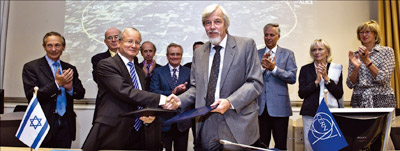
On 16 September, CERN’s director-general, Rolf Heuer, and the Israeli ambassador and permanent representative of Israel to the United Nations Office and other international organizations in Geneva, Aharon Leshno-Yaar, signed a document admitting Israel to associate membership of CERN, subject to ratification by the Knesset. Following ratification, Israel will become an associate member for a minimum of 24 months. Following this period, CERN Council will decide on the admission of Israel to full membership, taking into account the recommendations of a task force to be appointed for this purpose.
Israel has a strong tradition in both experimental and theoretical particle physics, with a major involvement at CERN during the 1990s in the OPAL experiment at the Large Electron–Positron (LEP) collider. Israel’s accession to observer status in 1991 followed an agreement to contribute funds to the CERN budget to support Israeli scientists, as well as providing equipment to CERN. The Israeli fund also contributed to running LEP and supported LHC construction and R&D for future accelerators. During its association with CERN, Israel has in addition supported Palestinian students at CERN, notably sending mixed Israeli–Palestinian contingents to CERN’s summer-student programme.
“It is a vital part of our mission to build bridges between nations. This agreement enriches us scientifically and is an important step in that direction,” says CERN director-general, Rolf Heuer. “I am very pleased that CERN’s relationship with Israel is moving to a higher level.”
In 2009, Israel was accepted as a special observer state, with the right to attend restricted Council sessions for discussions of LHC matters. Israel currently has strong involvement in the ATLAS experiment at the LHC and participates in a number of other experiments at CERN.








